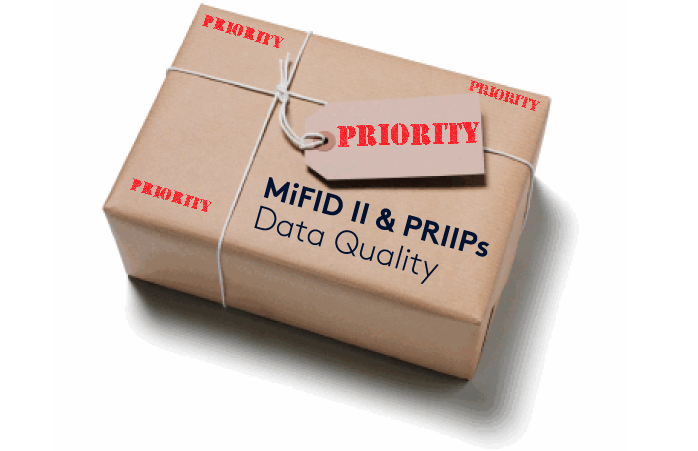MiFID II and PRIIPs Data Quality-Priority #1
In a recent whitepaper we published on SEC Reporting Modernization, we talked about how “timely, accurate, complete and consistent data are required for Forms N-PORT and N-CEN for two key reasons: these are public filings, and there are consequences to late or erroneous filings.” Not surprisingly, the same could also be said for the wave of European regulation due to arrive in January 2018 in the form of MiFID II and PRIIPs as asset managers attempt to successfully integrate the new regulations into their operations.
Let’s consider the risks first: the data that fund companies have to send under MiFID II and PRIIPs is for all intents and purposes public data, in that it goes to the fund managers’ distribution partners and then on to the wider public. The quality of that data as it’s delivered (our colleagues in Silverfinch take care of that delivery) will have an impact on the perception of the fund manager by the distribution partner. Subpar data, errors or incomplete information will not endear the fund manager to their distribution clients, as it exposes those distributors to mis-selling litigation risk. And then there’s the investors themselves – these individuals need this information in order to make informed choices on their investments, so the least they can expect is that the data is accurate.
There are broader regulatory and reputational consequences of failing to ensure the data is up to scratch – while the European regulators might have held back on use of the whip when it came to Solvency II in 2016, all the indications are that they’re going to be particularly strict on the adoption of PRIIPs and its implementation.
So what are the obstacles to generating complete and quality data? Again, it’s the same issues that we identified in our N-PORT whitepaper: “Investment management businesses have many intricate, highly connected moving parts, all of which consume and produce vast swaths of data on a daily basis. As a result, the firm will often have many fragmented silos of data, often overlapping with different levels of operational attention, update frequency and quality”.
Thus, if a fund manager is attempting to send out consistent, quality data for its MiFID II and PRIIPs clients, they will struggle if they don’t try to tackle these institutionally ingrained traps.
And here is the part that’s central to everything we believe: if you adopt a plan to tackle MiFID II or PRIIPs independently of each other, you’re actually contributing to the headwinds that we warn of – creation of silos, all with different procedures and protocols. If you deal with these rules separately from your data protocols or processes for other regulations, you’re making life more complicated and increasing the risk of wayward data leaving your company. If you process incoming data for one set of regulations without taking into account how that data might inform another set of rules, you’re just adding to the inconvenience that your internal functions face.
There really is only one solution – to deal with your data quality processes in one go and apply this system to all the tasks that this data might be find itself used for, whether that’s regulation, sales, MIS or business planning. That’s what we do at Accudelta, and it’s what fund managers need now more than ever with the onslaught of MiFID II and PRIIPs.



